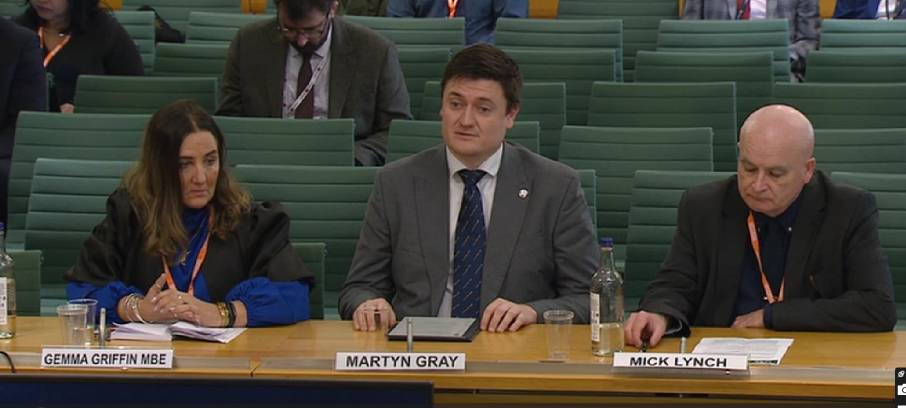
There have been warm words in the trade union movement for the UK government's Employment Rights Bill – but also some concerns expressed that the legislation may not go far enough. Sarah Robinson looks at how the Bill seeks to address some major injustices suffered by maritime professionals, and finds out what still needs to be done
The unlawful sackings of 786 seafarers by P&O Ferries in March 2022 rocked the UK maritime community and shocked the wider public, especially when it emerged that the country's employment law had loopholes allowing the employer to act with impunity.
P&O Ferries CEO Peter Hebblethwaite was called in to account for his actions in front of a parliamentary committee, but he simply shrugged his shoulders and carried on as before with his unethical actions of replacing long-serving UK maritime professionals with cheaper non-unionised agency staff.
He knew that the worst that could happen for his unlawful failure to consult trade unions was a ticking-off from MPs and the media, and perhaps a modest fine from the courts.
It was clear that significant changes were needed to UK employment rights law, and Nautilus has been pressing hard for these in the last three years – working alongside fellow affiliate unions of the UK Trades Union Congress (TUC).
Progress and setbacks in employment law
Some progress was made in 2023 with the passing of the Seafarers' Wages Act, setting out that the UK National Living Wage and National Minimum Wage would be applicable to seafarers working on vessels forming a service that calls into a UK port at least 120 times in a year. In the same year, a voluntary welfare charter was developed to further enhance seafarers' rights, and four shipping companies committed to this: DFDS, Stena Line, Condor Ferries and Brittany Ferries.
The Seafarers' Wages Act entered into force in December 2024 thanks to enabling legislation enacted by the new Labour government. This was a positive step, but the new government had more employment rights challenges on its plate, as the previous Conservative government had introduced fresh anti-worker legislation during its term of office.
The Strikes (Minimum Service Levels) Act had passed into law in July 2023 in the face of fierce opposition from trade unions. Under the provisions of that Act, many transport workers could be prevented from exercising their full right to participate in industrial action, owing to new obligations to provide 'minimum service levels' in some transport sectors.
Fortunately, the new government was ready to deal with this. As far back as 2021, the Labour Party (then in opposition) had launched A New Deal for Working People, understanding that the lives of British workers could be improved by strengthening individual and collective employment rights. This plan was further refined and became the basis of the Employment Rights Bill – which is now progressing through parliamentary scrutiny and on its way to becoming law, likely in late 2025.
What is the Employment Rights Bill?
The UK government says that the Employment Rights Bill represents a significant overhaul of employment protections, particularly for seafarers. The Bill was introduced in October 2024 as part of Labour's 'first 100 days' commitment to strengthening employment rights,
A central feature of the Bill is its focus on enhancing job security for seafarers. The legislation introduces stricter rules around collective dismissals, requiring operators to notify the UK government before dismissing 20 or more employees if they form part of a service that calls into a UK port at least 120 times in a year. This applies even if the employees are divided between different vessels, and is irrespective of the vessels' flags. The intention is that failure to comply can result in prosecution, seeking to close one of the loopholes exploited by P&O Ferries.
Additionally, the Bill seeks to end controversial 'fire and rehire' practices, except in cases where employers can demonstrate no viable alternative. This measure aims to prevent employers from unjustly altering terms and conditions, thereby safeguarding workers' established rights and terms and conditions of employment.
The government also intends to use the Bill to repeal the Strikes (Minimum Service Levels) Act 2023, restoring the rights that were in place until that legislation was passed.



Reactions to the Employment Rights Bill
Nautilus general secretary Mark Dickinson welcomed the Bill, calling it 'the biggest boost to workers' rights in a generation.'
The TUC – of which Mr Dickinson is president this year – has also stated: 'The Employment Rights Bill contains a positive and common-sense set of reforms. These will be crucial first steps towards delivering better-quality employment across the country.
'The Trades Union Congress strongly supports the bill. The legislation fulfils a number of the government's manifesto commitments by tackling several areas of unfairness in the labour market.'
However, there are concerns in the trade union movement that some of the wording of the Bill has been 'watered down' from the pledges made by Labour in A New Deal for Working People. Some commentators are also disappointed that the Bill does not go further in restoring workers' rights lost in the 1980s and 1990s – particularly the longstanding ban on secondary industrial action by one union seeking to support another.
In March 2025, the TUC issued a briefing for Peers as the Bill entered the Second Reading stage in the House of Lords, summarising the main issues for the legislative body and highlighting areas of 'further consideration' where the Bill could be strengthened.
Nautilus supports the TUC's positions, but is also carrying out its own intensive lobbying work, focusing on the fight to ensure that the legislation really does close the loopholes that allowed P&O Ferries to act as it did.
Areas of particular concern to Nautilus
Some issues seem relatively straightforward. For example, most stakeholders are satisfied that the Employment Rights Bill will successfully do its job of repealing the Strikes (Minimum Service Levels) Act 2023.
However, there are places where Nautilus is not certain that the Bill – as initially drafted – delivers on the pledges previously made to seafarers by the Labour government. Work is also needed to clarify the scope of certain parts of the legislation, and the Union wants to see the maximum benefit from this to maritime professionals.
UK wages in UK waters
The Bill will require maritime employers to pay the UK National Minimum Wage and Living Wage to a broader cohort of seafarers, but discussions are ongoing on what constitutes a 'regular' visit to a UK port and who this will affect.
Ending fire and rehire
The TUC says that the legislation – as initially drafted – is designed to limit the use of fire and rehire to situations where it is unavoidable, rather than outlaw the practice entirely. This is not satisfactory to the unions.
'It is … vital that loopholes are closed off that allow employers to slash pay and conditions simply to boost profits,' states the TUC briefing to the House of Lords. 'In particular, the proposed system appears to leave the way open for workers to be fired and replaced by agency workers. This must be closed off.
'Some employers include variation clauses in contracts that allow them to change aspects of terms and conditions. If this practice spreads it could undermine government attempts to clamp down on fire and rehire.'
Nautilus has added its voice to the strong pressure on MPs and Peers to strengthen the Bill in this regard.
Legal action against companies acting unlawfully
The TUC states: 'Unions should be able to seek injunctive relief to halt dismissals where employers have flouted the law.'
It has come as a shock to many – including MPs – that unions are currently so heavily limited in taking court action when employers act unlawfully, and it is a priority for the TUC to ensure this situation is rectified.
Even when a case of unlawful dismissals does make it to court, a major issue is that employers cannot be punished sufficiently for their actions.
In the case of P&O Ferries, it is on public record that the company unlawfully failed to consult with recognised unions over proposed job cuts. Neither did it comply with other legal requirements such as providing a notice period (the P&O Ferries seafarers were sacked with immediate effect and forced off their vessels by security guards equipped with handcuffs).
There is currently some recourse where employers have failed to consult in advance of redundancies, but this merely adjusts the maximum award at an employment tribunal. This 'protective award' element is limited to a maximum of 90 days' full pay for each affected employee – and in the case of P&O Ferries, was factored into the company's decision making.
There were early indications that the Employment Rights Bill would remove this cap and introduce unlimited fines, but at the time of writing, this is not included in the wording of the draft legislation.
Nautilus has met with the Transport Select Committee and with various Peers in order to strengthen the legislation, and will continue this effort through all stages of the parliamentary process.
- Nautilus will keep members informed of progress on the Employment Rights Bill, and the following website shows the current position of the legislation on its passage through parliament: parliament.uk/bills/3737



Let's talk about employment rights
The Employment Rights Bill is such a big issue this year that Employment rights for maritime professionals has been chosen as the theme of the Nautilus UK Branch Conference in November.
If you're a UK Nautilus member, make sure you have this date in your diary:
Nautilus International 11th UK Branch Conference
Wednesday 19 November 2025
09.00-17.00hrs
Holiday Inn Liverpool (Lime Street) and online
You can register now for the conference via www.nautilusint.org/events
Tags
